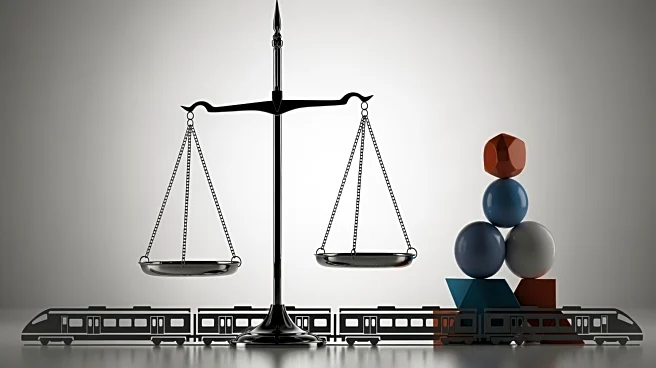What's Happening?
Governor JB Pritzker recently intervened in the legislative process concerning a major transit bill in Illinois. The bill, initially loaded with various new revenue ideas, aimed to address a projected fiscal deficit in the state's public transit systems.
However, Pritzker's intervention led to the removal of several untested revenue proposals, such as a tax on unrealized investment gains. The revised bill, which awaits Pritzker's signature, focuses on more traditional revenue sources like higher road tolls and fuel taxes. This intervention comes as Pritzker prepares to tackle another significant issue: pension reform. A coalition of unions, We Are One Illinois, is pushing to reverse pension reforms enacted in 2011, which have saved the state billions. The unions argue that these reforms do not meet federal requirements, but Pritzker remains cautious about any changes that could jeopardize the state's financial stability.
Why It's Important?
The intervention by Governor Pritzker in the transit bill highlights his role in ensuring fiscal responsibility in Illinois. By removing untested revenue ideas, Pritzker aims to prevent potential financial instability. The focus on pension reform is crucial, as the proposed changes by unions could increase state costs by $60 billion to $80 billion through 2045. This poses a significant risk to Illinois' credit rating and financial health. Pritzker's cautious approach to pension reform reflects the broader challenge of balancing union demands with fiscal sustainability. The outcome of these legislative efforts will have lasting impacts on Illinois' economy and public policy, affecting taxpayers and public sector employees.
What's Next?
As the transit bill awaits Governor Pritzker's signature, attention shifts to the upcoming legislative session where pension reform will be a key focus. The We Are One Illinois proposal, which seeks to undo Tier 2 pension reforms, is expected to be voted on in the spring session. Pritzker has indicated that the proposal requires significant revisions to avoid jeopardizing the state's credit rating. His continued vigilance and potential intervention will be crucial in shaping the outcome of pension reform efforts. Stakeholders, including unions and fiscal policy experts, will closely monitor these developments, as they could redefine retirement benefits and financial obligations in Illinois.
Beyond the Headlines
The debate over pension reform in Illinois underscores broader ethical and financial considerations. The push to reverse Tier 2 reforms raises questions about the balance between providing adequate retirement benefits and ensuring long-term fiscal sustainability. The state's approach to pension reform could set precedents for other states grappling with similar challenges. Additionally, the legislative process highlights the influence of unions in shaping public policy and the need for careful negotiation to align diverse interests. The outcome of these efforts will not only impact Illinois but could also influence national discussions on pension reform and fiscal responsibility.















